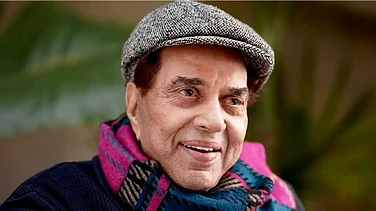In the recent years, Hindi films such as 'Manikarnika', 'Panipat', 'Tanhaji: The Unsung Warrior', 'Padmavaat', and the latest release 'Samrat Prithviraj', have been hauled up for their promises to portray historical facts but failing to do so or using a selective portion to suit a particular narrative to gain mass appeal. Many scenes or even characters in films based on history or historical events and figures are purely dramatised and are riddled with historical accuracies.
However, while Bollywood is being targeted for taking the liberty of rewriting history, Hollywood is the bigger culprit. For instance, the protagonist Maximus in 'Gladiator' essayed by Russell Crowe was fictional. No such character exists in Roman history. The World War II events depicted in 'Captain America: The First Avenger' are entirely fictionalised. Both movies were box-office successes, but the problem arose when a section of the audience believed that the fictionalised accounts are true.

“Don’t do that, please! Don’t distort facts in the name of creative liberty, just don’t!” exclaims Rakshpali Kishi, Independent Filmmaker and Co-founder of Daanpeti Films Pvt Ltd. “As an avid consumer of cinema, I don’t just source entertainment. I study the culture, accents, beliefs, style of storytelling, exceptional historical figures and the history of that time. My motive is to gather knowledge of what happened in the past that was of relevance,” she adds.
While Kishi says she’s aware that apart from creative liberties, red tape and controversies can also hinder storytellers from delivering 100 per cent accuracy, fidgeting with the past is still unjustifiable. “How can one re-write history in the name of creativity and serve the audience with twisted facts? Tweaking facts just to make the movie more interesting is not fair. It’s not that we don’t have fiction as a genre to explore. We do, and we do it right. But let’s not fictionalise and re-write history, rather serve it straight up with utmost sincerity and authenticity,” she adds.
However, will mere reproduction of facts devoid of experimentation provide moviemakers with a limited area to explore their creativity? Senior journalist and independent filmmaker, Akshay Acharya, tries to solve this conundrum. While history comprises different aspects of human civilisation like sociology, politics, and ideologies, he says it’s important to note that history also comprises science and art. And that both these fields thrive when allowed to experiment and toy around with possibilities as much as possible. He says, “Imagine if the cavemen (Homo erectus) didn’t accidentally light up the fire, our food habits and way of life would have looked very different today. Would there have been as many delicacies on our plate? Culinary art would never have made it to modern life because application of heat is vital for any edible substance.” Similarly, he says, what if artists never dared to experiment? “There wouldn’t be Yngwie Malmsteen or Neoclassical metal because the genre itself is a derivative of metal and classical music. Stories arising from alternate or fictionalised history also deserve to be told. However, such accounts must carry a disclaimer that these stories are a figment of imagination. The onus for consumption of such content would then lie on the audience. It would be up to them what they make of it.”
Even foreign literature, from which a lot of Hollywood historical films have taken inspiration, also tries to fictionalise certain portions of history or introduce purely fictional characters. Writer Sujata Parashar feels while portraying history through films, the makers must be mindful that there’s a delicate line between fact and fiction. She says, “But it’s not easy to draw this line as even history has many versions and almost always been written by the victors. Making a historical film is therefore a risk many Indian and western filmmakers have taken in the past. And it has not been an easy road.” She adds that it is not only films but also historical fiction writers who face the same dilemma. “My good friend and author, Medha Deshmukh Bhaskaran, had spent years researching on Shivaji and Sambhaji before she wrote books on both historical figures. When I read the books, I wanted to be sure about certain parts and so looked up articles and history books, and even had lengthy discussions with Medha before I concluded that history and its depiction in movies or fiction novels may be entertaining, but must not to be confused as a medium to educate oneself. You never know when history ends and fiction begins,” cautions Parashar.

For instance, 'Inglorious Basterds' rewrote the end portion of World War II. As the film became a massive global success, all over the globe, many people who didn’t know the real history ended up believing what the movie showed. Film writer-director, Madhureeta Anand feels this kind of creative call has to do with how and why filmmakers want to rewrite history. “It could be artistic liberty or propaganda. There’s a big difference between the two, and filmmakers always know which one it is. Also, it depends on how the publicity is done. In the case of 'Samrat Prithviraj', the promos claimed the information should be documented in school textbooks. Inglorious Basterds never did that. When there’s a malafide intention to change history, filmmakers should be stopped from claiming it’s real,” she observes.
Anand adds that while she’s absolutely against any kind of censorship. She says, “Filmmakers should put a disclaimer and be stopped from making publicity claims that what is being portrayed in the movie is real”. Adding to it, author and screenwriter Amish Tripathi says, “As has been said once, the difference between real life and fiction is that fiction is supposed to make sense! From the dawn of history, storytellers have interpreted history to write stories. Some of those stories have succeeded, and some have not. I think we should leave this subject between storytellers and their audiences.”
Is Hollywood then attempting to introduce fictional characters in historical films for the sake of convenience? Hollywood for a long period also demonised people and societies. Native Americans, Chinese, Arabs and Russians have been depicted as savages, while the Anglo Saxons are shown as the more civilised race. The same trend runs in Bollywood that portrays non-Hindi-speaking people as an unworthy lot. The audience who watches these kinds of movies is wrongly influenced and the resulting repercussions are felt in society; says author and senior journalist, Jagdish Keshav. Former senior journalist, Aparnna Hajirnis, adds, “I can’t tolerate historical facts being changed if there’s a religious or a political bias involved. You can, however, take certain liberties without changing the entire historical event, if the film is promoted as a work of fiction."























